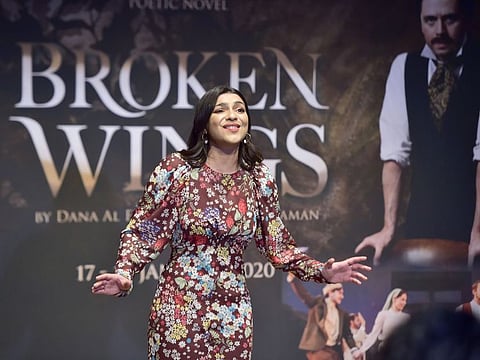‘Broken Wings’: Khalil Gibran’s West End show comes to Dubai
Nadim Naaman reveals why he wanted to create an English musical based on Gibran’s life

Theatre actor, producer and writer Nadim Naaman says that his West End musical ‘Broken Wings’ — based on Gibran Khalil Gibran’s eponymous book — is a long overdue “presentation for Arabic audiences to see themselves reflected on stage — not like ‘Aladdin’, or in a way that’s very fake. This is real Lebanon; these are real Lebanese characters.”
Naaman is set to bring the English-language stage adaptation, co-written by Dana Al Fardan, to UAE audiences at Dubai Opera in January, 2020.
“We very consciously wanted to do an English language production,” said the Lebanese-British actor at a preview in Dubai on Monday. “Gibran, although an icon of this region, only lived here until he was 12. He came back for a very short period of time, but essentially, he spent most of his life in America and Europe. He published his greatest piece of work, ‘The Prophet’, in English. He chose to do that because he wanted his work to reach the whole world and not just the Middle East.”
Lebanese-American poet Gibran published ‘Broken Wings’ in 1912. It served as a fragmented memoir focused on his first love. After five years in Boston, 18-year-old Gibran moved back to Lebanon where he met — and became enamored by — Selma Karamy, played here by the British-Pakistani actress Hannah Qureshi.
“This man, in my opinion, is the Shakespeare of the Middle East. He’s the most iconic poet figure of the region. His work transcends the entire world,” said Naaman.
“He’s a man who believes in universality, tolerance, peace, and human beings being treated equally. In a time where the world is extremely divided, we believe that his messages need to be heard once again, even though they were written a century ago.
“In 1912, [he] wrote a book about female equality and had been warmly welcomed into the United States of America as a Syrian refugee. These are things that are still in the mainstream media today.”
British-Iranian actress Soophia Foroughi plays Gibran’s mother, delivering an anthemic and powerful track, ‘Spirit of the Earth’. Naaman himself plays the 40-year-old version of Gibran, who is thinking back on his younger years.
“The first public performance of this was in August 2018 in the West End, but before that, we had already done two workshops and recorded the concept album, which is still available on digital platforms,” said Naaman.
“The orchestra, like the show as a whole, is designed to be a fusion of East and West in culture. We have a classical string quartet, very much European and operatic in style, but in addition to that, we have Arabic percussion and the oud. The idea is that it’s a combination of Gibran’s two worlds, colliding.
“There’s no Arabic lyric in the show at all — and I’ll tell you why. The Arab world knows this man and this book inside-out. What we’re trying to do is take him everywhere else.”


